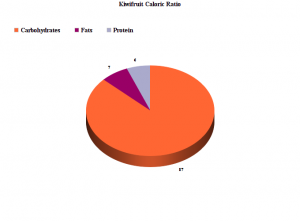Kiwifruit Nutrition Facts – (chinese gooseberries), held in storage, raw
The following kiwifruit nutrition facts were gathered by the US Department of Agriculture databases and they are the most accurate to date as far as we know.
Refuse: 14% (Skin)
Scientific Name:
NDB No: 09405 (Nutrient values and weights are for edible portion)
| Nutrient | Units | Value per 100 grams |
Number of Data Points |
Std. Error |
|---|---|---|---|---|
| Proximates | ||||
| Water |
g
|
83.05
|
4
|
0.661
|
| Energy |
kcal
|
61
|
0
|
|
| Energy |
kj
|
255
|
0
|
|
| Protein |
g
|
0.99
|
4
|
0.075
|
| Total lipid (fat) |
g
|
0.44
|
3
|
0.211
|
| Ash |
g
|
0.64
|
4
|
0.065
|
| Carbohydrate, by difference |
g
|
14.88
|
0
|
|
| Fiber, total dietary |
g
|
3.4
|
0
|
|
| Minerals | ||||
| Calcium, Ca |
mg
|
26
|
3
|
6.385
|
| Iron, Fe |
mg
|
0.41
|
2
|
|
| Magnesium, Mg |
mg
|
30
|
1
|
|
| Phosphorus, P |
mg
|
40
|
3
|
11.837
|
| Potassium, K |
mg
|
332
|
1
|
|
| Sodium, Na |
mg
|
5
|
1
|
|
| Vitamins | ||||
| Vitamin C, total ascorbic acid |
mg
|
75.0
|
0
|
|
| Thiamin |
mg
|
0.020
|
1
|
|
| Riboflavin |
mg
|
0.050
|
1
|
|
| Niacin |
mg
|
0.500
|
1
|
|
| Vitamin B-12 |
mcg
|
0.00
|
0
|
|
| Vitamin A, IU |
IU
|
175
|
1
|
|
| Vitamin A, RAE |
mcg_RAE
|
9
|
1
|
|
| Retinol |
mcg
|
0
|
0
|
|
| Lipids | ||||
| Cholesterol |
mg
|
0
|
0
|
|
Kiwifruit Caloric Ratio
This graph depicts the kiwifruit caloric ratio, meaning, how many calories (out of a hypothetical 100) come from carbohydrates, fats and protein.
This is different from the commonly used weight ratio, that only counts the amount of grams of nutrients. Additional information and kiwifruit nutrition facts can be found on this page.
As you can see, the vast majority of calories in a kiwifruit come from carbohydrates, a typical 100gram portion only contains 1g or less protein and 1g or less fats, while containing around 15-16g carbohydrates.
By weight, around 83% of a kiwi is just water, while around 3.5% is dietary fiber.
As for micronutrients, kiwifruits are a very good source of potassium and Vitamin C, as well as a good source of minerals and vitamins in general.

